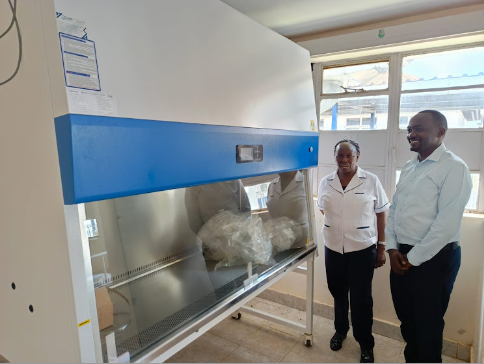Thika Level Five Hospital is set to begin offering chemotherapy services following the acquisition of a chemotherapy biosafety cabinet. This essential equipment ensures the safe preparation of cancer treatment drugs, protecting both healthcare workers and the environment from exposure to hazardous substances through its advanced containment system.
Speaking at the hospital, Superintendent Patrick Nyaga said the new machine would greatly improve cancer care at the facility and reduce the need for patients to travel long distances for treatment. “This advancement will make cancer treatment more accessible and convenient for residents of Kiambu and the surrounding counties,” Nyaga explained.
He highlighted the growing number of cancer cases in Thika and nearby areas, noting that many individuals are diagnosed too late. “With this new machine, we now have the opportunity to save many lives through timely treatment, eliminating the need to refer patients to Nairobi or even to India,” he said.
Nyaga also stressed that the chemotherapy biosafety cabinet will ensure the sterility of medications, improving both the safety and effectiveness of treatments. He called on the government to allocate more funds to further equip the screening facility and enhance service delivery for the people of Thika.
“I urge all county residents to take advantage of this facility and participate in regular screenings for breast, cervical, and prostate cancers,” Nyaga added.
“Early detection through routine screenings allows medical professionals to identify these diseases at an early stage and implement a treatment plan promptly, preventing the disease from advancing to life-threatening levels,” he stated.
Cancer has become a major public health issue in Kenya and across Africa. According to the latest World Health Organisation data, Kenya reported 44,726 new cancer cases and 29,317 cancer-related deaths in 2022. Currently, around 82,000 people in Kenya are living with the disease.
The Ministry of Health identifies the five most prevalent cancers in Kenya as breast, cervical, prostate, esophageal, and non-Hodgkin’s lymphoma. These types account for nearly 48% of the country’s cancer burden.
Counties in the Mt Kenya region, including Nyeri, Murang’a, Kirinyaga, Embu, Kiambu, Meru, and Nyandarua, rank among the top 10 devolved units with the highest number of cancer cases.
In response, the government has prioritized cancer diagnosis, care, and treatment, aiming to make it more affordable for families. With the establishment of the Social Health Authority (SHA), Kenyans can expect further relief from the financial burden of cancer care, as the scheme will cover the high costs associated with treatment for all.



